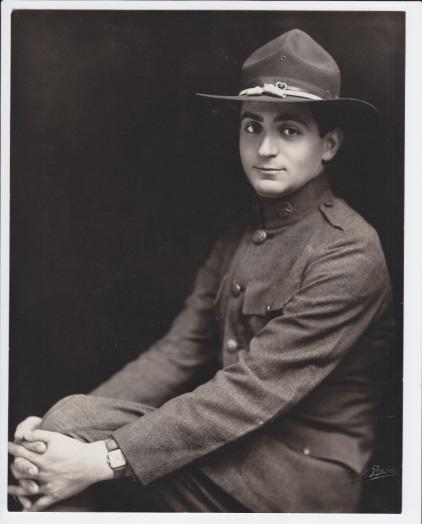We have a friend who’s a folk artist. A few years back he carved and painted two small refrigerator magnets that have become prized decorations in our kitchen. One is the Planters mascot, Mister Peanut; the other is the Pillsbury Doughboy, Poppin’ Fresh. Both are well made and absolutely nail the characters.
Our friend also likes to cook — Southern-style! Once, he said that whenever he boiled potatoes for mashing, he’d drain off the water and save it. The “broth” contained a lot of the starch from the spuds, as well as the potato flavor that’s currently popular in breads. He’d use this liquid instead of plain water whenever he made biscuits. The biscuits held together better and had a richer flavor!
It’s similar to what we do when boiling chicken for certain dishes: we save the “stock” and use it to flavor soups, casseroles, and our favorite chicken and rice dish. Guests often ask what gives the rice such a savory flavor. We always give the short, direct answer. But the longer, indirect answer is that we don’t waste anything; what many people decant, cut away, and cast out — assuming it to be worthless — is always put to good use in our kitchen. Even fruit and vegetable peelings can be composted.
Another item we save and “repurpose” is stale bread. We use it to make stuffing and bread pudding. Why waste a good thing, even if it appears to be “bad” — just like the cloudy liquid left over from boiled potatoes. In the kitchen, EVERYTHING that’s seemingly of no value, seemingly a “lost cause” or a “complete waste” can serve a good purpose. Savvy cooks never waste. And neither does God.
The savviest “cook” in the kitchen of life is our Heavenly Father, and He never wastes anything. He simply repurposes it for His use. That means the fallout from a failed relationship or business venture will be put to good use in our lives. God may use a painful or embarrassing experience to teach us a truth, help us develop better character, or get us ready for a bigger challenge. Sometimes, He simply wants to get us on the right track again, so that he can fulfill our special destiny.
He uses defeat to make us stronger. He repurposes grief to make us compassionate. He allows closed doors and missed “opportunities” to keep us out of trouble. He doesn’t waste anything.
 Whatever we’ve suffered, whatever we’re going through, whatever mistakes we’ve made, God always finds a good use for these “bad” experiences — which seem at the time like “lost causes”; like a “complete waste”! But in God’s kitchen there’s no waste. Every tear you’ve shed, every heartache you’ve endured, every moment of sorrow and suffering, doubt and despair — He’s restructured into something new and more wonderful. We usually don’t know what God is cooking up. Nor can we often see how He’ll repurpose something wrong and destructive into something right and renewed. But His Word explains to us that He continually does so. We can trust Him that our losses, our failures, our sorrows are never wasted. He is truly the God who renews, repurposes, restructures and reuses all we have and have gone through — the good, the bad, and the ugly.
Whatever we’ve suffered, whatever we’re going through, whatever mistakes we’ve made, God always finds a good use for these “bad” experiences — which seem at the time like “lost causes”; like a “complete waste”! But in God’s kitchen there’s no waste. Every tear you’ve shed, every heartache you’ve endured, every moment of sorrow and suffering, doubt and despair — He’s restructured into something new and more wonderful. We usually don’t know what God is cooking up. Nor can we often see how He’ll repurpose something wrong and destructive into something right and renewed. But His Word explains to us that He continually does so. We can trust Him that our losses, our failures, our sorrows are never wasted. He is truly the God who renews, repurposes, restructures and reuses all we have and have gone through — the good, the bad, and the ugly.
“…You meant evil against me, but God meant it for good in order to bring about this present result….” (Genesis 50:20 NASB)
“And we know that God causes everything to work together for the good of those who love God and are called according to His purpose for them.” (Romans 8:28 NLT)


 Israel — or “Izzy,” as he was known to his seven siblings — was born in 1888, in a small Russian town in Siberia. It was an impoverished village of Jewish families living in tiny houses which were little more than huts with dirt floors. Outside their homes, wild pigs sometimes roamed the crooked streets, churning up the mud and terrorizing children. Not exactly the kind of place that inspires cheerful songs. And yet, Izzy’s father, a cantor in the local synagogue, made sure his sons and daughters accompanied him each Sabbath for melodic readings from the Talmud.
Israel — or “Izzy,” as he was known to his seven siblings — was born in 1888, in a small Russian town in Siberia. It was an impoverished village of Jewish families living in tiny houses which were little more than huts with dirt floors. Outside their homes, wild pigs sometimes roamed the crooked streets, churning up the mud and terrorizing children. Not exactly the kind of place that inspires cheerful songs. And yet, Izzy’s father, a cantor in the local synagogue, made sure his sons and daughters accompanied him each Sabbath for melodic readings from the Talmud. That evening, Izzy’s father quickly gathered his family and very little else, and they crept away like thieves in the night. They didn’t have the passports required by Russian law to leave the country, but with a brutal new Tsar, Nicholas II, reviving anti-Jewish pogroms, breaking the law of an inhumane government was their only option for survival.
That evening, Izzy’s father quickly gathered his family and very little else, and they crept away like thieves in the night. They didn’t have the passports required by Russian law to leave the country, but with a brutal new Tsar, Nicholas II, reviving anti-Jewish pogroms, breaking the law of an inhumane government was their only option for survival. Izzy soon discovered he could make more money singing in the streets than selling newspapers, a fact that gave him hope for a brighter future. He quit school at 14 and started singing in the saloons, eventually working his way up to “singing waiter.” He’d make up new songs to amuse his customers, and at night after closing, he’d sit at the piano and practice. Izzy never received any formal training in music, but he learned everything he could from other Jewish musicians trying to make it in New York City. And always, he kept his eyes on the opportunities and promises of each new day.
Izzy soon discovered he could make more money singing in the streets than selling newspapers, a fact that gave him hope for a brighter future. He quit school at 14 and started singing in the saloons, eventually working his way up to “singing waiter.” He’d make up new songs to amuse his customers, and at night after closing, he’d sit at the piano and practice. Izzy never received any formal training in music, but he learned everything he could from other Jewish musicians trying to make it in New York City. And always, he kept his eyes on the opportunities and promises of each new day.